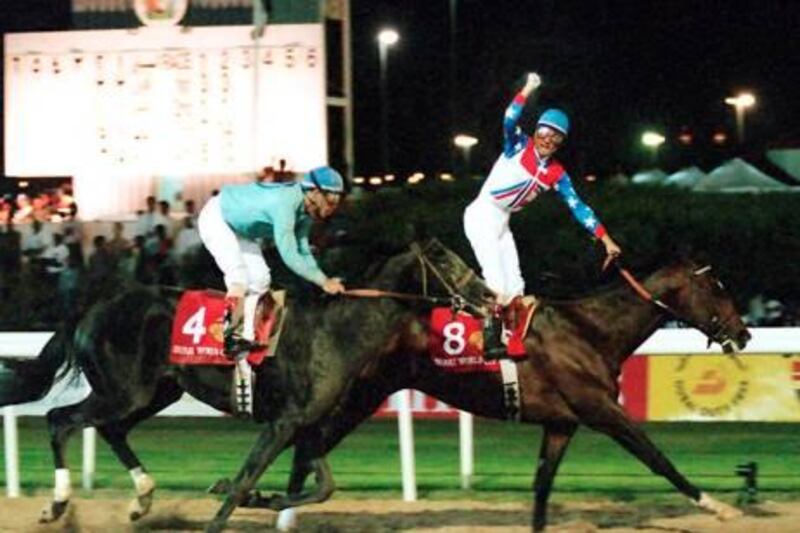A few days after the American horse Cigar won the inaugural Dubai World Cup in 1996 The New York Times ran an apology.
Underneath a photograph of the trophy presentation at Nad Al Sheba racecourse, a subeditor had misidentified the person awarding the trophy. The mistake appeared in the paper, much to the editor's chagrin.
"He was Sheik Maktoum bin Rashid al-Maktoum, the prime minister of the United Arab Emirates, not Sheik Mohammed bin Rashid al-Maktoum, the Crown Prince of Dubai," the apology read.
It was an error that was easily made all those years ago, purely because few people in America knew anything about Dubai - even where it was.
Cigar almost failed to make it to Dubai to put the race - and the emirate - on the map, however.
After 12 consecutive successes, he was considered America's horse of the year in 1995 and racecourses across the US clubbed together to match the extraordinary purse put up by Dubai. Sheikh Mohammed, who had been the driving force behind the venture, had offered US$4 million (Dh14.6m) in prize money. Even MGM, the entertainment company, was approached for funding in an effort to keep Cigar at home.
Unperturbed, Allen Paulson, Cigar's owner and a former aircraft manufacturer, flew the 13,000 kilometres to the UAE and brought his trainer, Bill Mott, and his horse with him.
It was the first time since November 1994 that Cigar had raced without Lasix, a diuretic that is permitted in America, and he had never raced under floodlights.
Cigar did not cross the Atlantic alone - there were two other American thoroughbreds, Soul Of The Matter and L'Carriere, who made the journey with him.
Horses were also sent from Japan, Britain, Ireland and Australia, while the Sheikh's personal stable, Godolphin, fielded four as the home defence.
As soon as the gates opened, Cigar faltered and slipped, leaving him in the middle of the pack behind L'Carriere, who led the whole way around the left-handed dirt track until Cigar loomed up as they turned into the straight.
Having reeled in his compatriot, Cigar looked to have the race at his mercy, but Soul Of The Matter produced a late challenge: a black shadow that looked impossible to shake off.
Stride for stride the pair duelled for the final 200 metres and even though Gary Stevens, Soul Of The Matter's jockey, felt he had edged in front of Cigar, there was half a length between them when it counted. "We thought the reward was worth the risk," said Mott, who, before departing for Dubai, had likened the expedition to a trip to the moon.
L'Carriere saw off the challenge of Pentire, the British horse, to give the US a clean sweep. "Let's hope they built theses stands solidly because the roof is going to come off when Cigar comes back," quipped Alastair Down, one of the television commentators.
It took time for the race to make a significant impact globally, with horses trained either in the United States or by Godolphin's Saeed bin Suroor responsible for 12 of the next 13 winners. Since the move from Nad Al Sheba to Sheikh Mohammed's glistening facility of Meydan, however, the $10m race has also been won by a horse trained in France, and this year for the first time by one trained in Japan. Horses from 26 countries have now featured on Dubai World Cup night, highlighting the international nature of the event.
The switch from dirt to a synthetic surface may have briefly stemmed the American challenge but Animal Kingdom is set to represent the US next year.
And The New York Times is unlikely to make a similar mistake if the Kentucky Derby winner prevails.






